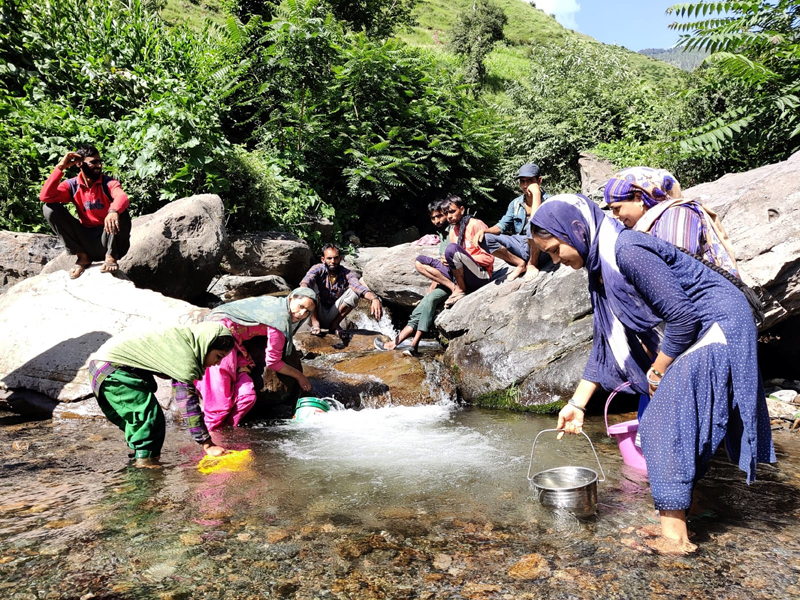Excelsior Correspondent
BHADERWAH, Aug 22: When more than 90 percent urban population of Bhaderwah Municipal limits and it’s peripheral areas have badly polluted the natural fresh water bodies flowing through the picturesque town by draining human waste and all the litter into them, the good news is that a small inaccessible hamlet inhabited by tribal Gujjars has shown the way how to keep water bodies clean and pollution free in minimum possible resources.
Implementing Government of India’s flagship scheme, the Swachh Bharat Abhiyan (Clean India Mission), in letter and spirit, residents of Aalan hamlet with a very low literacy rate and beside all of them belonging to below poverty line category, about a decade back decided that they will not litter near the water bodies and elderly villagers issued an advisory that all the households will make their own septic tanks.
The villagers of Aalan got together ten years ago to keep the Aalan stream flowing through the village clean. The modus operandi was to get all the villagers (50-100 in number), with the women on the front line, together on Fridays to sweep, clean and separate the waste (plastic from other waste) to prevent it from entering the water body.
Beside, adhering to the their elders advice to keep the natural fresh water body namely Aalan Nullah clean and fit for drinking, all the households digged pits and constructed septic tanks thereby becoming an epitome of the Prime Minister’s flagship scheme ‘ Swachh Bharat Abhiyan’ and an inspiration for the downstream villages and towns.
Located about 17 km from Bhadarwah town, Aalan in Katyara Panchayat of Jammu and Kashmir’s additional district Bhaderwah is a unique hamlet and the last village of the Union Territory on Chamba border of Himachal Pradesh State. Situated in the slope of mighty Ashapati glacier, the hamlet is at the confluence of the Kailash and Ashapati glaciers.
The village has 30 households with a population of 270. The main occupation of the village is farming, largely maize and raring cattle. The village gets adequate rain and derives its drinking water from Aalan Nullah and is distributed by pipes to each household. Bhadarwah town is located downstream of this village.
“While starting this initiative, our main aim was to prevent the garbage, including human and animal waste, from entering the stream. Another problem we had in the village is that the lanterns were open and majority of residents were practicing open defecation that pollute the water bodies badly. After our initiative a decade back to construct toilets in limited resources, Rural Development Department came forward to help us as a part of its Swachh Bharat Abhiyan and with their help we constructed soak pits and septic tanks,” says village elder Hashim Din Teenda (70).
“We want to set an example for adjoining villages and especially Bhaderwah town that sends all its sewage into the natural water bodies that flow in the town where people are already complaining of ailments such as kidney stones because of this polluted water. We do not want to do that; we have a responsibility as the upstream village to send clean water to downstream villages and Bhaderwah city” said Rozy Begum (20) the only lady of the village who has studied upto 12th standard.
It is notable to mention here that according to 2011 census, in Bhadarwah town out of total 2029 houses, 1987 are without septic tanks and all the human waste is flown to the open drains through which it enters into the three fresh water streams flowing through the town namely Neeru, Halain and Puneja Nullah.
“Technically, Bhaderwah town is number one in J&K in terms of open defecation followed by Budgam district but surprisingly Municipal Committee Bhaderwah has managed to declare Bhaderwah ODF town four years ago which is a cruel joke with us,” said Aashiq Ali Watal president Watal Association J&K.
“Till 1984, all of us used the water from all the three streams for drinking and cooking food but unfortunately we polluted the fresh water bodies so badly that now they stink. We should take lesson from poor Gujjar community of Aalan village and Government agencies should also take immediate corrective measures to save the precious water bodies,” said Dharam Kant Dogra, an environmentalist from Bhaderwah town.


